Viral marketing for mobile games: cheap and effective
Preamble
There are a lot of articles now being released that try to analyze recipes for creating a successful game. Often, “uniqueness” is put first. It is easy to say, but difficult to do, and there are enough examples when a high-quality clone was carried by a fatal arrow into the back of the pioneer creators. The problem with clones is that they are difficult to promote, especially in the journalistic environment. The latter in general often refuse to write a review, arguing that the game does not bring anything new to the market. In this article I want to talk about a non-trivial, but more than successful experience in promoting the Angry Birds clone we created. It was a few years ago on j2me, but in this case, the idea is more important than years ago and the platform.
Strategy
In 2010, the game Angry Birds became the leader-inspirer for developers, every week a new variation of “evil birds” appeared in the world. We closely followed the plans of Rovio to port the game to other platforms and realized that if we quickly transfer their hit gameplay to Java phones, we will be able to outrun them on this still very profitable platform.

Problems
Nevertheless, we understood that, most likely, we are not alone so clever, and some big game studio with which it will be difficult for us to compete, is already drawing its version of the game for j2me. Later it happened: one of the leaders of the mobile market was ahead of us with the release exactly for a week.
')
Another problem we saw was market fatigue from the Angry Birds counterparts: endless clones of the game were so fed up with reporters that the chances of publishing a press release were approaching zero somewhere. We needed a good competitive advantage, some kind of fresh marketing idea, and we found it.
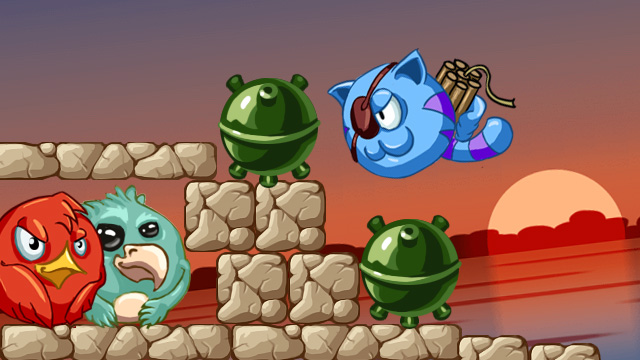
Tactics
A clone will always remain a clone, no matter how you call it, but it is much more interesting and promising to engage not in direct plagiarism, but in making a parody. In Angry Birds, the “bad guys” are pigs, and the birds, in general, are good heroes, just determined. We decided to show the world their dark side. The idea of a campaign to promote the game was born: to sow anti-angry_birds moods and show that all evil in the world is from famous birds.
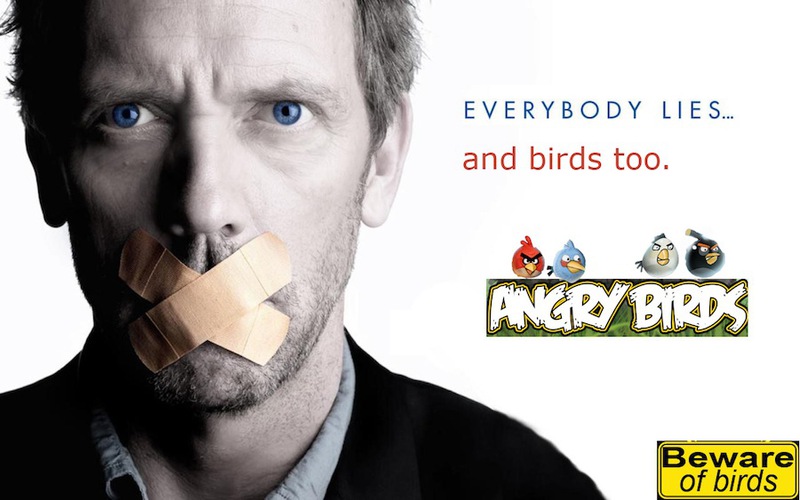
Marketing campaign
We took the viral marketing strategy as a basis. We created the fictional organization Wikibirds (similar to Wikileaks), which condemned the universal angry_birds-mania and was determined and uncompromisingly tuned.
To attract the attention of journalists and potential distributors of the game, Facebook and Twitter were used as the most popular and modern means for coordinating revolutions (as was the case at that time, for example, during riots in Egypt, Tunisia and riots in London).
Under the guise of organizing the liberation of the world from "evil birds", we invited the leading game-journalists to participate in our struggle, becoming our followers on Twitter and joining our group on Facebook. Most journalists liked the anti-angry_birds mood, and they took part in the non-binding campaign as a breath of fresh air in the middle of a huge chicken farm. It was not that there were a lot of followers, but we were interested in the majority of those we needed.
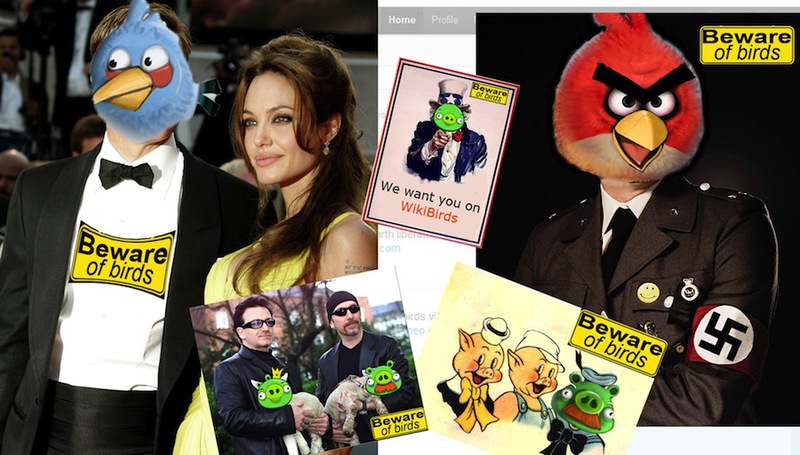
In social networks, we regularly published cartoons on evil birds. Each such work was encrypted in one letter, from which, ultimately, it was possible to make the name of our game. A video ridiculing Angry Birds was also published, and judging by the fact that a few days later it was removed from the Youtube portal with the note “at the request of the copyright holder”, our “efforts” were noticed even in Rovio. After the campaign ended, Facebook and Twitter pages were also closed.
On the day of release, all our subscribers were announced that a weapon against Angry Birds was created, and this is our game.
results
The result of the campaign was the publication of many reviews of the game on Russian and foreign portals, where our game received positive ratings and good reviews, and even hit the top five games in May 2011 according to the KnowYourMobile portal. Partners were happy to take the game on their channels, and even a competitive product from the market giant, which appeared simultaneously on our j2me, did not interfere with our placement on off-and on-portals titles.
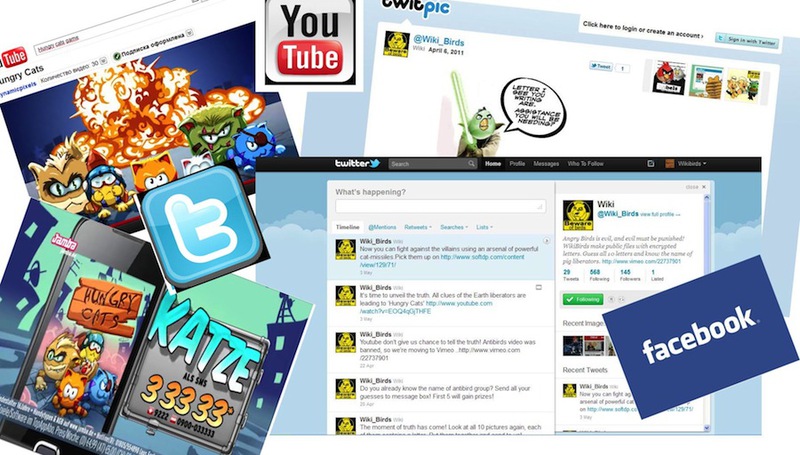
Afterword
Using viral marketing to promote products is not a new thing and even routine in some ways, but it is a great tool for promoting mobile games. The campaign itself was spent a minimum of money and effort: it involved only two people who paid to share only an hour a day, using only Twitter, Facebook, Youtube and Photoshop. We took advantage of the general hysteria around the Wikileaks resource, the topicality of the topic laid down perfectly on the viral component of our action: information about Wikibirds spread without our participation, we only supported and fueled the interest by publishing funny pictures and videos on social networks.
At the exit, we got an excellent result, both in terms of coverage of the game in electronic media and in the number of sales, which met our expectations by 100%. And this campaign in 2011 received the first prize in one of the competitions for mobile marketing campaigns of the year.
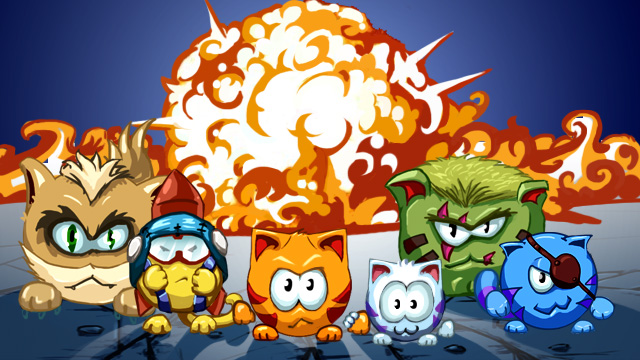
I hope our experience will inspire someone to their marketing campaigns. Good luck!
There are a lot of articles now being released that try to analyze recipes for creating a successful game. Often, “uniqueness” is put first. It is easy to say, but difficult to do, and there are enough examples when a high-quality clone was carried by a fatal arrow into the back of the pioneer creators. The problem with clones is that they are difficult to promote, especially in the journalistic environment. The latter in general often refuse to write a review, arguing that the game does not bring anything new to the market. In this article I want to talk about a non-trivial, but more than successful experience in promoting the Angry Birds clone we created. It was a few years ago on j2me, but in this case, the idea is more important than years ago and the platform.
Strategy
In 2010, the game Angry Birds became the leader-inspirer for developers, every week a new variation of “evil birds” appeared in the world. We closely followed the plans of Rovio to port the game to other platforms and realized that if we quickly transfer their hit gameplay to Java phones, we will be able to outrun them on this still very profitable platform.

Problems
Nevertheless, we understood that, most likely, we are not alone so clever, and some big game studio with which it will be difficult for us to compete, is already drawing its version of the game for j2me. Later it happened: one of the leaders of the mobile market was ahead of us with the release exactly for a week.
')
Another problem we saw was market fatigue from the Angry Birds counterparts: endless clones of the game were so fed up with reporters that the chances of publishing a press release were approaching zero somewhere. We needed a good competitive advantage, some kind of fresh marketing idea, and we found it.

Tactics
A clone will always remain a clone, no matter how you call it, but it is much more interesting and promising to engage not in direct plagiarism, but in making a parody. In Angry Birds, the “bad guys” are pigs, and the birds, in general, are good heroes, just determined. We decided to show the world their dark side. The idea of a campaign to promote the game was born: to sow anti-angry_birds moods and show that all evil in the world is from famous birds.

Marketing campaign
We took the viral marketing strategy as a basis. We created the fictional organization Wikibirds (similar to Wikileaks), which condemned the universal angry_birds-mania and was determined and uncompromisingly tuned.
To attract the attention of journalists and potential distributors of the game, Facebook and Twitter were used as the most popular and modern means for coordinating revolutions (as was the case at that time, for example, during riots in Egypt, Tunisia and riots in London).
Under the guise of organizing the liberation of the world from "evil birds", we invited the leading game-journalists to participate in our struggle, becoming our followers on Twitter and joining our group on Facebook. Most journalists liked the anti-angry_birds mood, and they took part in the non-binding campaign as a breath of fresh air in the middle of a huge chicken farm. It was not that there were a lot of followers, but we were interested in the majority of those we needed.

In social networks, we regularly published cartoons on evil birds. Each such work was encrypted in one letter, from which, ultimately, it was possible to make the name of our game. A video ridiculing Angry Birds was also published, and judging by the fact that a few days later it was removed from the Youtube portal with the note “at the request of the copyright holder”, our “efforts” were noticed even in Rovio. After the campaign ended, Facebook and Twitter pages were also closed.
On the day of release, all our subscribers were announced that a weapon against Angry Birds was created, and this is our game.
results
The result of the campaign was the publication of many reviews of the game on Russian and foreign portals, where our game received positive ratings and good reviews, and even hit the top five games in May 2011 according to the KnowYourMobile portal. Partners were happy to take the game on their channels, and even a competitive product from the market giant, which appeared simultaneously on our j2me, did not interfere with our placement on off-and on-portals titles.

Afterword
Using viral marketing to promote products is not a new thing and even routine in some ways, but it is a great tool for promoting mobile games. The campaign itself was spent a minimum of money and effort: it involved only two people who paid to share only an hour a day, using only Twitter, Facebook, Youtube and Photoshop. We took advantage of the general hysteria around the Wikileaks resource, the topicality of the topic laid down perfectly on the viral component of our action: information about Wikibirds spread without our participation, we only supported and fueled the interest by publishing funny pictures and videos on social networks.
At the exit, we got an excellent result, both in terms of coverage of the game in electronic media and in the number of sales, which met our expectations by 100%. And this campaign in 2011 received the first prize in one of the competitions for mobile marketing campaigns of the year.

I hope our experience will inspire someone to their marketing campaigns. Good luck!
Source: https://habr.com/ru/post/173405/
All Articles